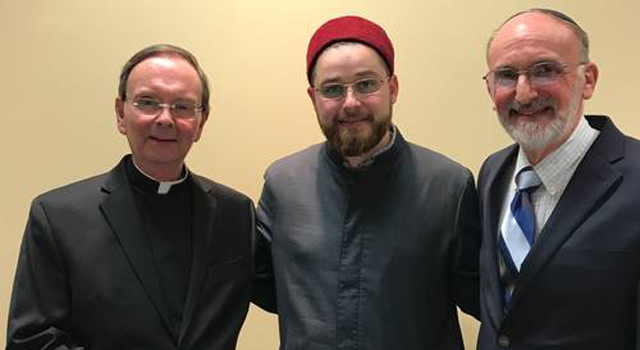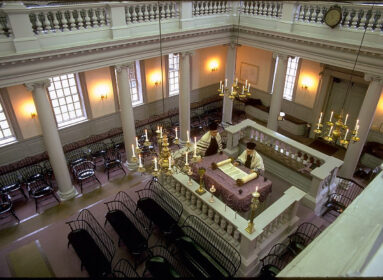
Interfaith panel seeks “Common Ground – Holy Ground”
By Cindy Mindell
WEST HARTFORD – Why did the rabbi cross the road?
For Yitzchok Adler, spiritual leader of Beth David Synagogue, a Modern Orthodox shul in West Hartford, it was to get to the other side – where St. Thomas the Apostle Church was hosting “Common Ground – Holy Ground,” an interfaith panel presentation that debuted in March.
The event, co-sponsored by the Jewish Community Relations Council of Greater Hartford, featured Adler alongside St. Thomas’s Fr. Edward Moran, and Imam Omar Tawil of Farmington Valley American Muslim Center, Inc., moderated by Patrick Laorden, social justice coordinator of the Office for Catholic Social Justice Ministry. Some 200 members of the three Abrahamic faiths came together to learn about one another’s beliefs and to ask questions, and the turnout inspired a second program on May 15, which will include the same panelists. This time, the priest will cross the road to Beth David Synagogue.
It was a burgeoning friendship between Adler and Moran that laid the foundation for “Common Ground – Holy Ground.” The two had been spiritual leaders in neighboring houses of worship on Dover Road for 20 years and yet had never met face-to-face. Two years ago, the priest approached the rabbi to ask for help learning Hebrew.
They began meeting once a week, alternating between the church on one side of the road and the synagogue on the other, and although they didn’t get past Bet, they did develop a deep friendship.
Last winter, when a spate of bomb threats roiled Jewish communities throughout the U.S. – including West Hartford – the priest asked the rabbi to come to their weekly meeting early. “He and the church administrator handed me an envelope and Ed said, ‘In this envelope is the master key to every outside door of our church,’” Adler recalls. “’If something ever were to happen at Beth David, when you had to abandon your building, we want your congregants to feel safe and secure in our church, and even if the doors are locked, you’ll be able to get in.’” When the source of the threats was traced to a mentally unstable man in Israel and deemed benign, Moran told Adler, “It doesn’t make a difference – the next call could be real.”
As the two spiritual leaders have gotten to know one another, they have brought their respective congregations together in collaborative activities: a Jesse’s Garden at Beth David tended by both memberships, a class taught by Adler at St. Thomas, and a weekly class co-taught by Adler and Moran that alternated between the church and the synagogue.
Late last year, the rabbi and the priest decided to widen their interfaith circle. Moran asked Patrick Laorden of the Office for Catholic Social Justice Ministry to invite to the table a representative of the local Muslim community, which led him to the Farmington Valley American Muslim Center and to Imam Omar Tawil.
Laorden agreed to serve as moderator of the first “Common Ground – Holy Ground” program and together, the four men came up with questions and guidelines to address at the event. The panelists agreed to steer clear of questions that were political or that referred to current events, Laorden says, in keeping with a shared goal of creating a better-informed audience – something easily stymied by an attendee bearing a political agenda.
“The whole idea of the program is to demonstrate where the three Abrahamic faiths share common values,” Adler says. “Of course there are differences – that’s why there are churches, synagogues, and mosques, and the differences can be and often are stark. However, the picture is not complete unless we are also able to identify, embrace, and celebrate the facets of faith that are common to all three of us. I think everybody – particularly the more fervent believers of their own faiths – has certain hesitations about dialogue with other faiths and I think this experience was truly mind-opening.”
What Adler found most instructive was Imam Tawil’s responses to audience questions about Islam.
“He did a very good job of separating the mass of the Muslim population – specifically in the United States – from the radical and terrorist branches of Islam that are pursuing terrorist enterprises around the world,” Adler recalls.
In the end, the program served its purpose, Adler says: a Christian, a Jew, and a Muslim shared common space and was each able to converse with dignity, respect, and compassion.
“Every one of my congregants, without exception, came out of that assemblage feeling empowered and proud,” he says. “They’re the ones who encouraged me to do it again and this time, to do it at Beth David.”
Laorden says that several attendees described the experience of seeing a priest, a rabbi, and an imam together in the same room was nothing less than “historic.”
“It is my firm commitment to seek as much common ground between all God’s people,” says Fr. Moran. “Our parish’s mission is to welcome and respect all people of good will. As a result of these dialogues, I have a deeper respect for both Rabbi Adler and Imam Tawil. In our polarized world, it is a good and holy endeavor to live compassionately. In fact, I would say that this is our mutual mandate: to build a better world.”
Interfaith dialogue has very deep roots in Jewish history, with plenty of examples evident in Rabbinic literature, Adler points out. While this type of communal relationship is more commonly pursued today by liberal Jewish denominations, the Modern Orthodox rabbi sees it becoming more customary among Orthodox colleagues as well. He believes that the establishment of modern Israel has a lot to do with this development.
“Recently, we’ve observed that there are branches of Christianity that are as supportive of the state of Israel as we could only hope for in the Jewish community,” he says. “Perhaps some of the anxiety and tension of earlier generations – if not earlier centuries – have somehow been mitigated and massaged by the success of the state of Israel. It’s a very different world now, as far as Judaism is concerned, than it was 100 years ago. There may not be less antisemitism, but the success of the state of Israel has definitely impacted interfaith and international dialogue.”
For the May 15 discussion, the panelists are working on a new set of questions, including a few that they didn’t get to address during the first presentation. “We found that dialogue is essential for all three religions,” Laorden says. “One question that we will try to explore at the second event is, how does the dialogue continue when the other doesn’t want to participate?”
The program is open to anyone interested in that conversation.
“The larger the attendance, the more the spirit of validation will be felt by everyone who comes,” Adler says. “Critical mass speaks volumes to purpose.”
“Common Ground – Holy Ground:” Tuesday, May 15, 7-8:30 p.m., Beth David Synagogue, 20 Dover Road, West Hartford. Open to the community, free of charge. For information: Patrick Laorden, (860) 242-5573, ext. 2686.
CAP: The “Common Ground-Holy Ground” interfaith panel at Beth David Synagogue on May 15 will include (l to r) Fr. Edward Moran, Imam Omar Tawil and Rabbi Yitzchok Adler.







 Southern New England Jewish Ledger
Southern New England Jewish Ledger












